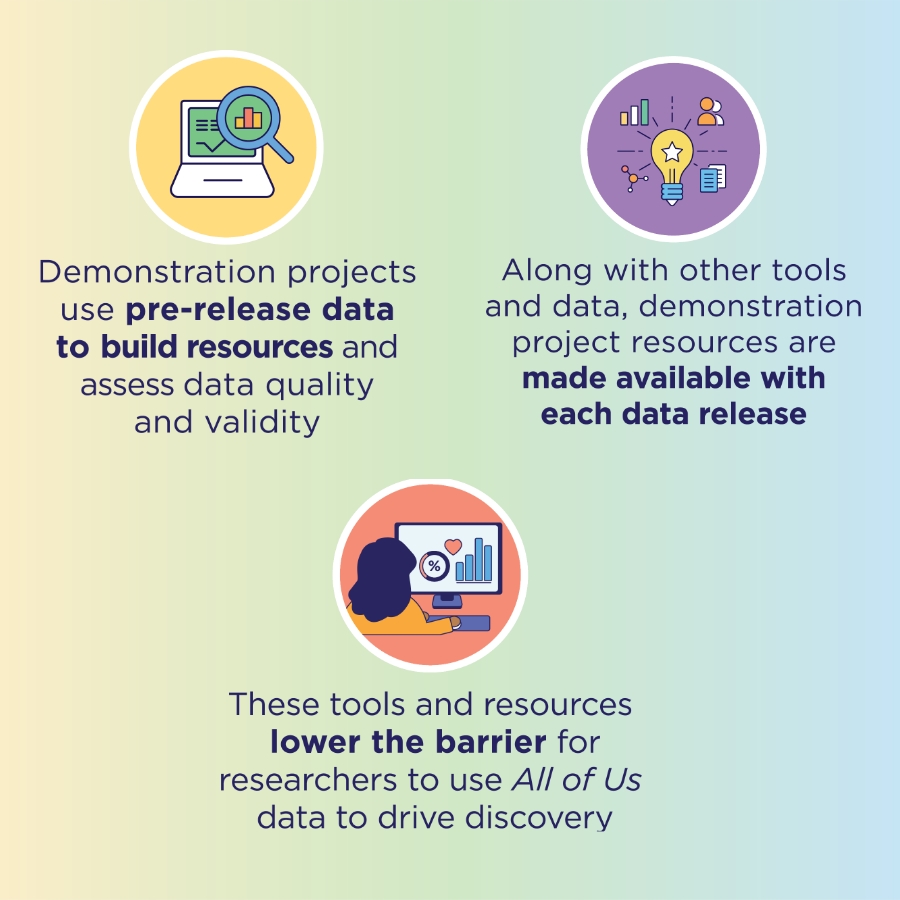
Demonstration projects shape new tools and resources in the All of Us Researcher Workbench.
With the June 2022 data release, the All of Us Researcher Workbench now includes health data from more than 372,000 participants, including information from nearly 20,000 people who have been infected with SARS-CoV-2 and more than 57,600 initial responses to the new social determinants of health survey. Registered researchers can access this data in the Researcher Workbench and use it to explore potential associations across a variety of factors, from genetics to geography to mental health.
Before each data release, the new data and tools that will be made available are carefully evaluated through demonstration projects. These projects, carried out by researchers affiliated with the All of Us Research Program consortium, aim to test new data types and tools prior to their inclusion in the Researcher Workbench. Demonstration projects not only help ensure the value and integrity of the All of Us dataset, but also lead to invaluable resources for the researcher community.
At the start of the All of Us Research Program, demonstration projects were vital to evaluate the program’s measurements, guide protocol development, and examine the quality, usefulness, validity, and diversity of the research data and platform. As the platform continues to grow, demonstration projects remain important to the program.
Demonstration projects replicate known, previously published findings. These projects do not aim to discover new diseases, relationships, or risk associations. The primary role of All of Us consortium members is to build a data resource that is broadly accessible for the research community, not to make novel discoveries through their demonstration projects. Right now, nearly 50 demonstration projects have been conducted or are underway. Of those, more than 10 have already been published as research papers.
Demonstration projects are also a source of early user feedback. As All of Us Chief Data Officer Andrea Ramirez, M.D., M.S., explained, “Demonstration projects have been critical in helping us understand how researchers will approach new datasets and identifying what sort of resources would be most helpful to provide.”
Finding Pharmacogenomic Interactions in the All of Us Dataset
Philip Empey, Pharm.D., Ph.D., an associate professor of pharmacy and therapeutics and the associate director for pharmacogenomics for the Institute for Precision Medicine at the University of Pittsburgh, co-leads a set of demonstration projects that involve genomic data. His “Pharmacogenomics (PGx) variant frequency and medication exposures” project was designed to corroborate variant-drug interaction data as found in other research databases.
Many gene variants are known to alter medications’ effectiveness or produce undesired side effects. Because Dr. Empey’s team wanted to understand how frequently well-known variants occur within the program’s diverse participant population, they studied the prevalence of variants in the whole genome sequencing data of participants of different genetic ancestries. They also looked at medication data found in participants’ electronic health records.
The team’s work not only confirmed the results of other well-known analyses, but also yielded other insights. They found that prescription rates were high in participant health records, suggesting that the pharmacogenomics results the program plans to provide to participants through the forthcoming “Medicine and Your DNA” report may be useful to many.
Dr. Empey’s team recently presented their demonstration project data at the Clinical Pharmacogenetics Implementation Consortium and Pharmacogenomics Global Research Network conference. They aim to submit manuscripts on pharmacogenomics and hereditary disease risk for publication in the coming months.
Exploring Demonstration Projects in the Workbench
Demonstration projects like Dr. Empey’s and others have helped All of Us anticipate the needs of future researchers and make it easier for new Researcher Workbench users to get started. Some demonstration projects have become featured workspaces on the platform, providing researchers with end-to-end sample analyses to jump-start new studies and collaborations.
Currently, 10 demonstration project workspaces are available on the Researcher Workbench, with sample analyses on systemic disease and glaucoma, hypertension prevalence, cardiovascular risk scoring, and other topics. Registered researchers can also access 15 tutorial workspaces to learn how to begin working with Workbench data and tools. Both types of workspaces can be found under “Featured Workspaces” in the Workbench. After logging in to their accounts, researchers can open or duplicate the workspaces of their choice.
Detailed instructions on how to access and use featured workspaces can be found in the User Support Hub. If you are not yet a registered researcher, learn how to join other researchers exploring the All of Us dataset.
This article appears in the August 2022 issue of All of Us Research Roundup. Subscribe to receive future issues of the bimonthly researcher newsletter.
View the full August edition of the All of Us Research Roundup here.
All of Us is a registered service mark of the U.S. Department of Health & Human Services (HHS).
